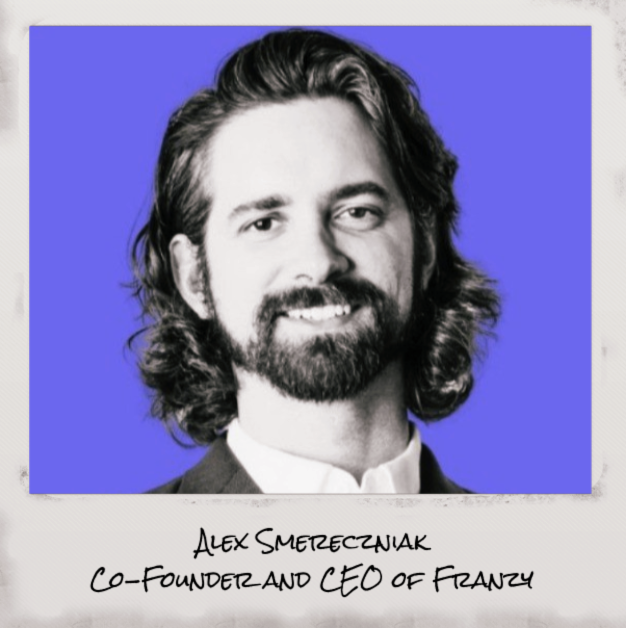Betting on Yourself in the Franchise Economy
Alex Smereczniak wasn’t born into franchising—but he’s reshaping how it works.
Today he’s the co-founder and CEO of Franzy, a platform that helps people evaluate, compare, and buy into franchises. Think Zillow for franchising—complete with lending, legal referrals, real estate support, and transparent brand data that levels the playing field for first-time business owners.
But before he was leading a venture-backed startup, Alex was hustling to buy a laundry service as a college freshman.
The College Business That Changed Everything
Alex’s first real taste of entrepreneurship came at Wake Forest. He was 18, working for a student-run laundry pickup and delivery business. The founders were graduating. He wanted to buy it.
The price? $25,000. He had $2,000.
So he got scrappy. He recruited two partners, pulled together $11,000, and started knocking on the doors of Wake’s business school professors—despite not being in the program yet. One professor took him seriously. Taught him how to do a DCF. Walked him through the valuation. Showed him how to structure the deal.
It worked.
After buying the business, they pitched Wake Forest on including laundry service as a checkbox option during freshman orientation. The school loved it. Parents thought it was official. Revenue jumped from $25,000 to $250,000 in one year. With a 70% margin.
That experience changed everything. Business classes became real. School became a lab. Entrepreneurship wasn’t a dream—it was a system.
A Quick Detour Into Corporate Life
After graduation, his co-founders wanted the resume boost—marketing at Pepsi, banking on Wall Street. Alex wanted to expand. But instead of going it alone, he took a job at Ernst & Young.
“I thought consulting would feel entrepreneurial,” he says. “New clients, new problems. But it was slow, inefficient, and honestly kind of boring.”
He lasted 18 months. Not the first in our blog to not feel at home within the big consulting narrative.
“I missed laundry.”
Building 2ULaundry and LaundroLab
In 2016, Alex launched 2ULaundry, a tech-enabled laundry service focused on multifamily buildings, homes, and commercial clients. The playbook: combine logistics and software to bring convenience to an outdated space. Think Uber for laundry.
They raised $33 million. Scaled to multiple cities. But the model wasn’t perfect.
Quality was inconsistent. Margins were tight. So in 2018, they pivoted to vertical integration—owning the laundromats themselves. That meant more control, better service, and higher margins.
Still, laundromats are expensive. A single location cost $1M+ to build.
So they made a bold move.
In 2021, they spun off a new brand—LaundroLab—and began franchising the physical locations. The results were immediate: 118 locations sold in the first 14 months. 30+ stores open today.
Falling Into Franchising (and Seeing the Problems)
Launching LaundroLab gave Alex a front-row seat to the franchise economy—and the problems baked into it.
“There’s no transparency. No data. And way too many bad actors,” he says.
He was shocked to learn that franchise brokers—many of whom have zero certification or training—regularly collect 60% of the brand fee as commission. “You and I could become brokers today. There’s no regulation. And most prospective franchisees have no idea.”
And yet franchising is enormous.
“Most people don’t realize it’s 8% of the U.S. GDP,” he says. “It’s not just McDonald’s and Subway. It’s hotels. Health and wellness. Moving companies. Gutter cleaning. Painting. HVAC. Most of the services we rely on every day are franchises.”
That disconnect—between how big the space is and how outdated the process feels—became the catalyst for Franzy.
The Franzy Vision
Franzy is what happens when a founder with a startup mindset enters a legacy industry.
The goal is simple: make franchising more accessible, transparent, and aligned. Like Zillow did for real estate.
Franzy’s platform includes:
Profiles of thousands of brands
Investment breakdowns
Revenue averages
Litigation and bankruptcy history
Territory availability
Videos and photos
A built-in support system for legal, lending, and real estate
It’s built for the person who knows they want to own a business—but doesn’t know where to start (or doesn’t want to pretend they do).
Serving the Other 64%
According to a Gallup poll, 67% of Americans want to own a business. Only 3% ever do.
That’s the gap Franzy wants to close.
“Not everyone’s going to build the next AI tool or SaaS company,” Alex says. “But there are thousands of people who could run a great car wash or fitness studio or moving company. Franchising gives them a path in.”
And while LinkedIn is filled with unicorns and headlines, the real economy still runs on people who paint houses, clean gutters, manage gyms, and run food delivery zones.
“These are real entrepreneurs,” he says. “But they don’t get the spotlight.”
What’s Next
For Alex, the future isn’t just about scaling Franzy—it’s about reframing what entrepreneurship looks like.
He calls it the “Bet On Yourself Economy.”
As AI wipes out more white-collar jobs, he predicts a surge in blue-collar and service-based entrepreneurship. Franchises will be one of the most viable ways in.
“In every economic downturn, franchising booms,” he says. “We saw it in 2008. We saw it during COVID. And we’re going to see it again now.”
Franzy wants to be ready.
We’re maybe more bullish on the future of service-based businesses than anyone. If you’re running one yourself, and haven’t applied to the Thrive community yet, it might be time to change that.

